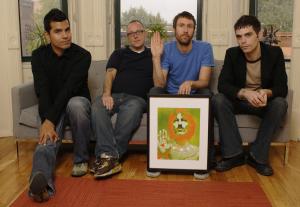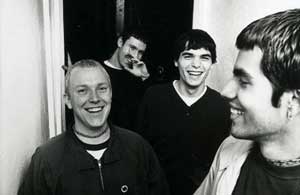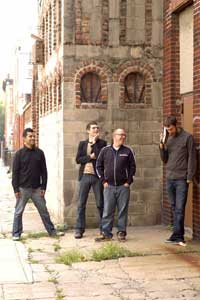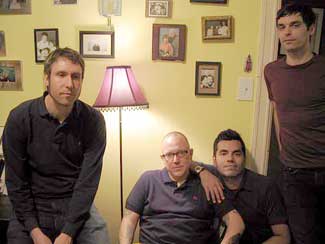
It was recently announced that beloved post-hardcore quartet Texas Is The Reason would be reuniting for a performance in New York City this fall. Tickets for the show go on sale today.
Punknews.org spoke with guitarist Norm Arenas about the reunion and got some answers to some of the questions that have followed the band since their sudden breakup in 1997.
Originally formed by former Arenas, a former Shelter guitarist and 108 drummer Chris Daly, the band released a handful of singles but only one full length, the classic Do You Know Who You Are?. Just as they were alledgedly signing to a major label for the follow up, the band split up with members going on to join and form New Rising Sons, Jets to Brazil, and New End Original.
How are you?
Pretty good. Just relieved that itâs sort of over right now. There was a lot of preparation for the show. The whole leak thing was unexpected and that put everything into overdrive because everyone I knew started calling me. I hadnât told a lot of my best friends.

Sorry about that.
Itâs alright.
It is interesting because itâs been ten years since the album now, and Iâm sure youâve been offering these things before so Iâm wondering why you decided to do this now?
We definitely have been offered reunion shows before - a lot of festivals and related things. As far as festivals went, there was this feeling that if we were going to do something it would be our thing. As a band, we were always very possessive of our identity and any time something happens without our input - from the record label or whatever, it would send us into a tizzy.
The idea of playing a festival was entertaining, but ultimately we didnât think we could make it an event. Especially after ten years, it feels like more of an event to me because itâs probably something weâve thought about at several points in the last ten years. It never became consummated because we were living in different parts of the country.
The last time we were offered a reunion, I was living in San Francisco, Scott [Winegard] was in Huntington Beach, Garrett [Klahn] was in Buffalo, [Chris] Daily was in Brooklyn. So we knew we wouldnât be able to practice and do it properly.
When I moved back to Brooklyn a couple of years ago, it was the first time in ten years that we were all living in the same city. We all started hanging out again; weâve always been close friends, before and after the band, so it didnât feel like a stretch to play again.
A show in New York makes sense then. But is there any sort of emotional reason that it feels like a good time?
I think we tend to - human beings in general - organize our lives around anniversaries and dates. I think turning 33 is wonderful, but most people itâs more monumental to turn 30 or 40. We thought about it, and it has been ten years so it seems like a good time to turn back and think about it.
Realistically, to make a record and have people still talk about it ten years later is a rare thing. It doesnât happen very often and we all feel privileged and honored that anyone still cares. Itâs as much of a celebration for us. Weâre all extremely proud of that band, and in the past couple of months since weâve started playing and talking and hanging out, weâve all kind of made the confession that there was something special about that moment that will not be repeated.
Ray Cappo was only 21 years old when thousands of kids were worshipping him. He should be way more fucked up than he is.
For you and Chris Daily in particular, this was your band too. 108 was Vicâs mainly⦠Shelter was Ray Cappo.
We first started talking about Texas when 108 and Shelter were on tour together in the summer of 1993. Chris and I both played in Resurrection together in 1991. Weâve been friends for a long time, and Scott is my oldest friend.
I do think that there was a sense that Chris and I sat down and we were listening to the tapes - we listened to tapes back then - and looking at a lot of the same types of things. Not a heck of a lot of it sounded like the music we were playing on that tour. Texas was a chance for us to establish ourselves musically and also to create a musical vision that was ours. That was special for all four of us. Up until that point, none of us had that chance.
The front men of both those bands must have made that pretty daunting.
The whole Shelter thing was a huge learning experience. When I joined Shelter in 1992, I was 18 years old. I grew up in New York, in the New York hardcore scene.
I also grew up seeing Ray Cappo. I think a lot of people - myself included - in the 80s looked at him in a different way. Now in retrospect, Ray Cappo was only 21 years old when thousands of kids were worshipping him. He should be way more fucked up than he is.
As much as people like to trash talk him, I have a lot of respect for him. Thatâs a mental survival. To be put into a position where so many people admire you and listen to you and respect you in this way and at the same time revile you. To come out of that, somewhat normal, that takes a lot of mental strength.
It taught me a lot about becoming a little bit unaffected by what was going on outside my "mission" or whatever my goal was.
Was Ray running Revelation at the time?
No, he was running Equal Vision.
Seemed like he just ran around America founding labels.
Founded a lot of labels, sold a lot of labels.
Are you guys thinking of reissuing anything? You must have some other stuff kicking around.
Early on, there was a show in Boston where we started playing and kids started a mosh pit. We stopped and I got on the mike, and said: "I donât know what you kids are hearing, but I donât think we sound like Agnostic Front."
Weâve talked about it, but nothing solid. When we broke up, we did have material that was never recorded that we were playing live. We do plan to play a couple of those songs. They were songs that we loved and always remembered and wished that they had been recorded. Weâve talked about recording them, but our main focus is to make this show as special as possible.
Weâre still trading ideas and weâre still a ways off from the actual execution. The biggest importance to me is not to see a "regular rock concert" with some dudes in jeans and t-shirts. Weâre really going out of our way to make sure that people walk away saying that this was special.
As far as set list, you had relatively little recorded material. Are you planning to do the material from end to end?
Definitely not in sequence; the sequence of the album always bothered me. I always wanted the album to start with "Do You Know Who You Are?" I got outvoted.
We are rehearsing everything weâve ever done and a lot of stuff that people have never heard. Itâs still a couple months to go, and it could go in any direction. Anyone who is worried that weâre not going to play a song is not going to have to worry. Weâre going to play everything and then some.

Itâs also strange to me in retrospect how people look back at things. For example, I was talking to someone about At the Drive-In and I notice that at the time, people didnât really like them and yet now theyâre revered. You guys were in a bit of the same boat. Coming from the backgrounds you did, and being on the label you did, how did kids respond when they saw a flyer that said Texas is the Reason and you were billed as ex-Shelter and ex-108 and then you came out an Garrett started singing?
This is an interesting thing, because a lot of people have forgot. Iâve been reading the message boards on your site, and itâs interesting to look at everyoneâs perspective. I know some of the kids were poo-poo-ing your use of the word post-hardcore. I honestly donât remember anyone ever calling us an emo band. The word "post-hardcore" was used more than anything else, mostly because we were from 108, Shelter and Resurrection. We still hung out in the hardcore scene. Our first show was in the Equal Vision house in New York when it was in Manhatten. Sick of it All were all there, Snapcase were all there. This is where we were from.
Our second show was in New Jersey with Mouthpiece, Ignite, Snapcase. We were definitely the sore thumb of the bill. To me, if we had to be genre-ified. It portrays something that happened. We were all in hardcore bands and then we did something else.
As far as the response goes; the response was a confused one. It took some time to establish an identity for the band that people could understand. Early on, there was a show in Boston where we started playing and kids started a mosh pit. We stopped and I got on the mike, and said: "I donât know what you kids are hearing, but I donât think we sound like Agnostic Front."
It was important to us that everyone could enjoy the show equally. Maybe we were under the influence of Fugazi, but I thought that stage diving and slam dancing were rote. Once the mainstream took them over, they didnât belong to us anymore. Punk kids were supposed to be pioneers of some sort, and doing things for the sake of tradition was what punk railed against. I think we should rail against our own traditions.
It is a little confusing.
It took a little while for kids to understand where we were coming from. It also took a little while for us to find bands we related to. We played shows with everyone from Madball to Ida. Quicksand took us out; our third show was opening for Quicksand at the Academy in front of 3000 people. They really helped us out a lot.
Later on we met bands like Samuel, Christie Front Drive, Mineral and the Promise Ring. It was funny, because now in retrospect, people put something on all those bands, but at the time, we thought we were doing something really different from each other.
My biggest bonding moment with Mineral was when their drummer Gabe [Wiley] showed me his Warzone tattoo. It was kind of nice meeting these people coming from a hardcore place and doing something different.
I always defend the use of "post-hardcore" in this case because itâs literally true. Fugazi came out of a bunch of hardcore bands, ergo theyâre post-hardcore. It just makes sense to me.
I donât really understand why a Texas record is emo, but the Foo Fighters is rockân roll. Itâs not really that different. Itâs still distorted guitars, sometimes fast, sometimes slow.
We werenât coming from Nirvana though.
The thing I appreciate the most about Texas was the tenacity of the fans. I never felt we were unappreciated. The people who loved Texas is the Reason loved Texas is the Reason. Our last show in Germany, I think was our "last" show because it was so amazing.
Chris and I had a conversation before the show talking about the end of the band. I remember saying to Chris, "If tonight is awesome, I would be totally fine with this being the last show."
I walked on stage and we opened with "Antique" and when Garrett started singing, there were eight hundred Germans singing along with us. I looked at Daly and knew that this was over.
People always bring up the fact that you guys split up just as you were signing a big deal with a major label.
It wasnât a secret. We were in the final stages of picking a label and in the end it was between Interscope and Capitol. We chose Capitol. At the time Gary Gersh was the president, Steve Patch was the A&R guy. We knew him a little because he used to do publishing and he had given Jawbox their publishing deal. He had just signed Ida who are probably the greatest New York band ever.
I walked on stage and we opened with "Antique" and when Garrett started singing, there were eight hundred Germans singing along with us. I looked at Daly and knew that this was over.
Weâd agreed to sign the contract and then we went on tour. While we were on tour, we talked to our lawyer and the contracts were ready to sign and we were going to sign as soon as we got home. We ended up making it final on the plane ride home and told everyone we were breaking up.
If you read our very first biography - the one that came with the first EP - even then it seemed like we were breaking up. Everyone thought we were always on the verge of breaking up.
In fact, we did break up while we were on tour with Sense Field. We broke up for about a week and then finished the tour.
Thatâs unusual because you mentioned you guys were all still friends and usually these things go down like a bad relationship where no one wants to see anyone again.
Thatâs the thing; in general with Texas it was such an intense period of time. Itâs so difficult to describe how intense this band was. The 7-inch was essentially a demo we recorded in Brian McTiernanâs basement. My amp was next to a washing machine.

It was never meant to be a 7-inch, but those three songs kind of blew things up in really strange ways. All of our friends from New York were all on major labels - Quicksand, Orange 9MM, Sick of It All - they were all in that world. Our friends had taken jobs at major labels. Just by default, there were three A&R guys at our first show - because they were friends of ours.
When we were talking about signing, we thought we could sign with Jade Tree or Revelation or Atlantic. There wasnât a middle ground at the time. When we signed to Revelation, we had a multi-album deal with Revelation and thought everyone would just go away, but it just made things crazier. People wanted to buy out our contract, sending limos for us and giving us hotel room. One A&R guy bought us groceries while we were on tour.
It was intense and you need to go through the lens of retrospect. We were all in our early to mid-20s and we didnât know how to deal with it. It was hurting our friendships and that was more important in the long run and thatâs why we broke up.